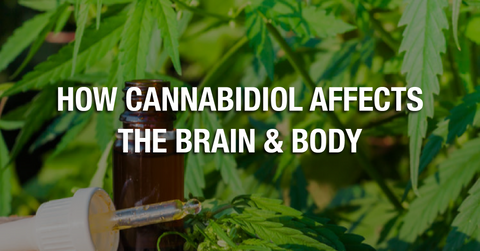 HEALTH
HEALTHHow Cannabidiol Affects The Brain & Body

Jan. 14 2021, Published 4:55 p.m. ET
Cannabidiol (CBD) derived from the hemp and cannabis plants is gaining popularity among users due to its therapeutic and health benefits. CBD along with THC are the two major cannabinoids that are studied due to their neurological and psychological effects upon consumption.
Cannabidiol imparts its effects like reducing inflammation, pain, anxiety, stress, and seizures, etc., due to its effect on the endocannabinoid system (ECS) of our body. In this article, we will investigate about CBD’s effect on the body and brain.
The Difference Between CBD And THC
THC and CBD are the two major compounds found in the cannabis plant; CBD concentration is higher in the hemp plant. Also, both CBD and THC have the same empirical formula, but different molecular structures. This is the reason for the difference in their effect on ECS. THC attaches to CB1 receptors of the ECS and causes psychotropic effects associated with it.
On the other hand, CBD interacts with CB2 receptors of the ECS to impart its therapeutic and health benefits. Moreover, in cases like chronic pain, THC to CBD ratio of 1:1 is found to be effective than using them alone. Also, when consumed together CBD inhibits the negative effects of THC like paranoia and anxiety.
Scientific Evidence Of CBD’s Therapeutic And Medical Effects
Reiterating from the introduction, CBD is popular among users due to a multitude of therapeutic CBD benefits and their application for treating ailments. Multiple clinical studies have been conducted to understand its efficacy in treating different ailments including psychological conditions like depression and anxiety.
Furthermore, CBD is effective for treating depression and anxiety due to its anxiolytic and stress-reducing effects. Also, this effect is thought to be useful in avoiding relapse in people dealing with drug addiction.
Related: Could CBD help you improve your sleep cycles and combat insomnia? Click here to learn more.
CBD's effectiveness in treating childhood epilepsy have been studied in detail by scientist and the results look promising.
Because of this, the FDA approved the use of the synthetic CBD derived drug – Epidiolex for treating Lennox-Gastaut and Dravet syndrome in children above two years old. CBD has neuroprotective effects due to its anti-inflammatory and stress-reducing properties.
This is also one of the reasons it is found to accelerate the recovery of people who suffered a stroke. All these are due to cannabidiol’s ability to influence a wide range of receptors or receptor systems spread through the body.
The Cerebral Receptor Systems
Want OK! each day? Sign up here!
The fundamental cellular structures that make up the brain are called neurons and there are approximately 86 billion neurons in the brain. They communicate with each other at the meeting points through the structures called synapses. The neurons communicate across the synapses with the help of chemical messengers called neurotransmitters.
Moreover, the sensitivity of a neuron to a specific neurotransmitter depends on whether it has receptors that attach to this neurotransmitter like a lock and key mechanism.
Also, each neuron has multiple receptors that are sensitive to different neurotransmitters in the brain. Two of the well-known neurotransmitters are dopamine and serotonin, but there are others as well.
Related: Can CBD help to manage or suppress anxiety? Click here to find out more.
The receptors in the brain are not only sensitive to the neurotransmitters naturally produced in the brain but also responds to cannabinoids like THC and CBD.
This is because they have molecular structures like the neurotransmitters, and this is the reason for their psychotropic and psychoactive effects. Furthermore, the CB1 and CB2 receptors of the ECS are like the receptors mentioned in earlier.
CBD's Effect On The Receptor Systems
CBD benefits are mainly due to its effect on CB1 and CB2 receptors of ECS. Apart from this, it also increases the levels of neurotransmitters naturally produced by the brain like serotonin by inhibiting its reuptake at the synapses, thereby avoiding its breakdown. Besides, CBD interacts with pain receptors like TRPV1 or vanilloid receptors that regulate pain perception.
Also, it interacts with dopamine receptors that play a crucial role in behavior, cognition, and motivation, etc. Due to this CBD can be used to dampen drug cravings and avoid relapses in patients undergoing de-addiction.
CBD's Effect On The Serotonin System
Serotonin along with dopamine are the two important neurotransmitters in our body, and serotonin is mainly associated with homeostasis. CBD activates serotonin 1A receptors, and this is the reason for its effect of reducing neuropathic pain, reducing nausea and vomiting, treating anxiety and depression, and managing symptoms of schizophrenia, etc.
However, more research is required to better understand these effects so that CBD benefits can be used as an alternative treatment for psychiatric conditions mentioned.
CBD also influences the endocrine system which is a network of hormones and the glands secreting them. The endocrine system regulates the proper functioning of organs and organ systems, and it plays an important role in metabolism and maintaining body temperature.
On a final note, due to CBD's effect on different receptor systems in our body, understanding them in detail can be a complicated process. However, what has been understood from scientific studies and clinical trials looks promising.


